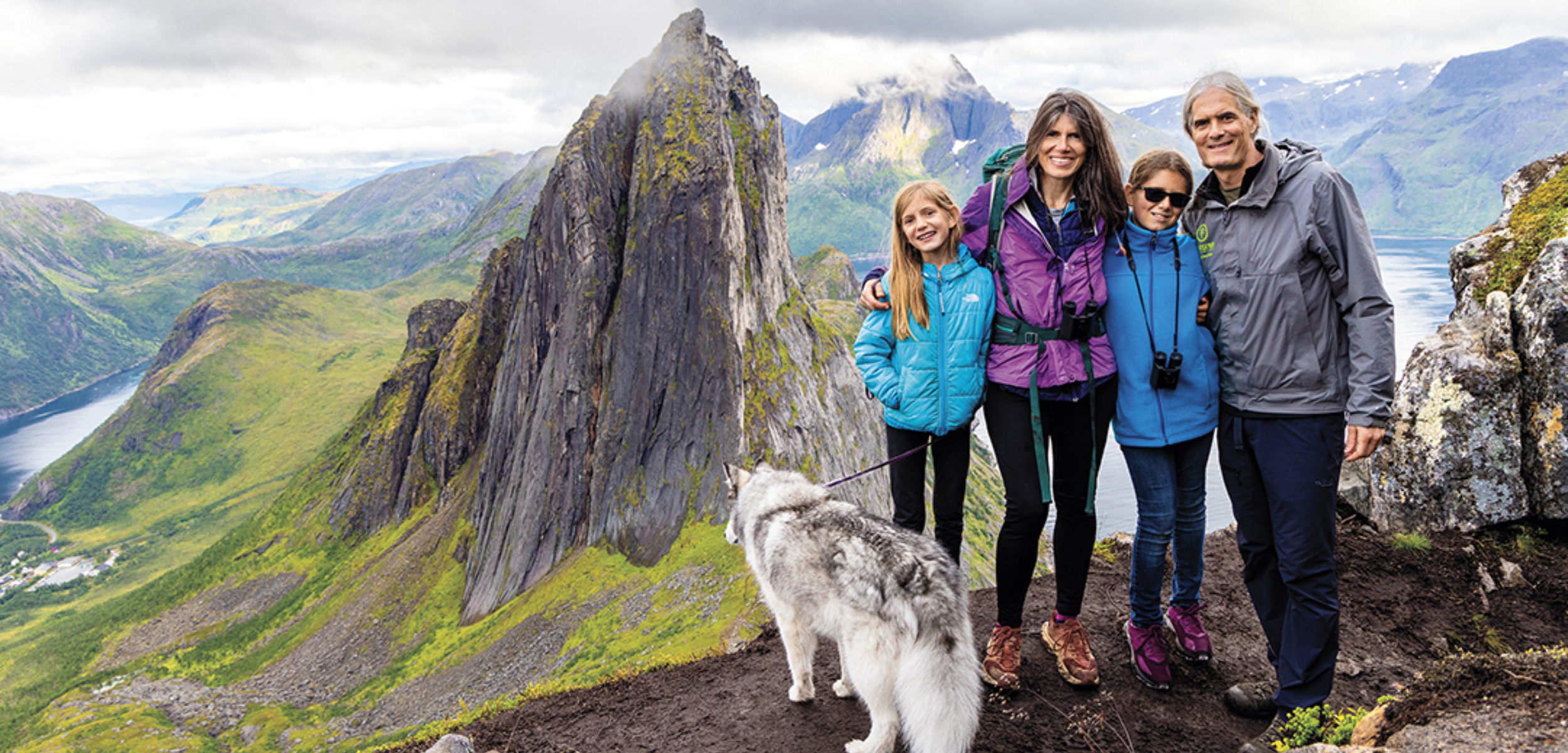
Central Washington University is known for a lot of things, not the least of which is our world-renowned faculty.
Every year, CWU professors and researchers are invited by their colleagues around the world to visit other countries so they can share their expertise with fellow scholars at peer institutions.
As an added bonus, they return to Central with a wealth of information that they proudly impart to their colleagues and students. In recent years, members of the CWU faculty have traveled to all seven continents—yes, including Antarctica—to fortify their already robust knowledge base.
In terms of prestige, the recently completed academic year was particularly impressive. In 2022-23, CWU boasted three Fulbright Scholars among its ranks: Provost Michelle DenBeste, Associate Dean of the College of the Sciences Elvin Delgado, and Geological Sciences Professor Susan Kaspari. Their selections helped Central earn recognition from the Department of State as a Fulbright U.S. Scholar Program Top Producing Institution.
“This is a pretty big deal for CWU to have three Fulbright Scholars in the same year,” said DenBeste, who visited France last fall. “Having three selections in the same year is amazing, even for a larger institution. This recognition just goes to show that Central is home to some of the most influential scholars in higher education.”
DenBeste, Delgado, and Kaspari are among the approximately 900 U.S. scholars—faculty, administrators, or other professionals—who were chosen to lecture and/or conduct research in a wide variety of academic and professional fields during the past year.
The Top Producing Institution recognition is given to the U.S. colleges and universities with the highest number of applicants selected for a single academic year.
“This is so great for Central,” Kaspari said. “All three of us will return enriched and inspired to share what we learned with the CWU community.”
“Receiving a Fulbright is a great honor for me and my colleagues,” Delgado added. “But, most of all, it highlights the quality of faculty we have here at Central.”
Fulbright is the federal government’s flagship international educational exchange program, and it is among the largest and most diverse exchange programs in the world. Since its inception in 1946, more than 400,000 participants from all backgrounds and fields—including recent university graduates, teachers, scientists, researchers, artists, and others from the U.S. and 160 other countries—have participated.
Fulbrighters study, teach, conduct research, exchange ideas, and contribute to finding solutions to complex global challenges. The program’s alumni include 41 heads of state or government, 62 Nobel Laureates, 89 Pulitzer Prize winners, 78 MacArthur Fellows, and countless leaders and changemakers who carry forward the Fulbright mission of enhancing mutual understanding.
DenBeste, Delgado, and Kaspari were preceded in recent years by three CWU colleagues: Geography Professor John Bowen (Scholar, 2019-20), Sport and Movement Studies Professor Stefan Ward (Scholar, 2020-21), and Associate Professor of Student Engagement and Community Outreach Maureen Rust (Specialist, 2021-25).
Central’s three current Fulbright recipients recently shared their experiences with Crimson & Black. The following are brief overviews of those conversations:
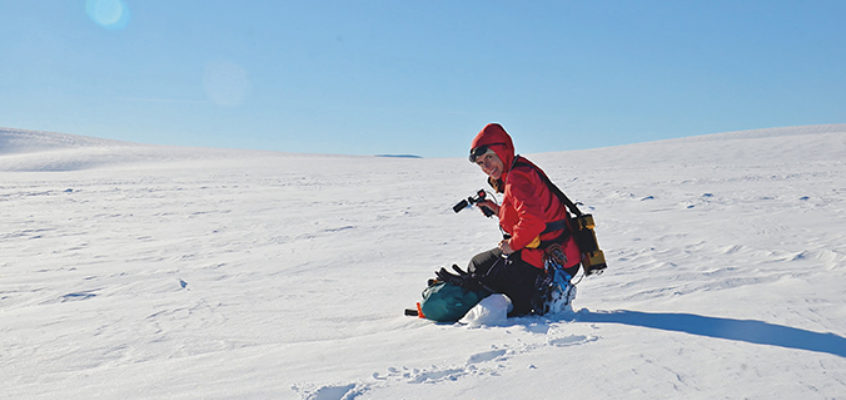
Kaspari examines the presence of black carbon, dust, and organic materials in the snow in Svalbard, Norway.
Susan Kaspari
The longtime CWU geological sciences professor completed her nine-month Fulbright Scholar program in Norway this spring, and she plans to remain in Europe until July with her husband and their two children, ages 12 and 9.
Since her arrival last August, Kaspari has been engaged in sustainability work as both a professor and researcher. She has spent the majority of her time in the city of Tromsø, and doing research and teaching on Svalbard.
Kaspari said it’s hard to put into words how valuable her Fulbright experience has been for her as a professional and as a person. Among the highlights: “I saw polar bears up close!” she exclaimed.
“As a researcher, I am excited to be initiating new projects in the Arctic, which is warming faster than any other place on Earth,” said Kaspari, a 2021 Distinguished Faculty award recipient. “Being able to study these changes in person has been very informative for me, and the opportunity I have had to do research in the Arctic will also be integrated into my teaching in my climate-related courses.
When Kaspari first arrived in the Arctic, she investigated the presence of black carbon, dust, and organic materials in snow in and around Svalbard. In the months that followed, she established new research collaborations, spent time at the Norwegian Polar Institute, and attended conferences on ice cores and glaciology in Switzerland and Sweden.
She also taught a course for two weeks at the Arctic University of Norway, where she co-advised a graduate student for most of the year, and was a guest lecturer in a glaciology course at the University Centre in Svalbard.
“As an educator, living in Norway has been eye-opening since I have such a strong interest in sustainability,” Kaspari said. “Because of Norway’s strong social system, everyone here is food-secure, has access to housing and health care, and the cost of attending university is negligible. This will certainly influence my teaching in my sustainability-related courses at CWU.”
Kaspari said the most eye-opening revelation for her while living in Norway has been the contrast between the Norwegian social safety system and that of the United States, where community organizations (e.g., food banks, Planned Parenthood, and Habitat for Humanity) are needed to fill the gaps. This divide is especially intriguing to Kaspari when she examines the situation from a social sustainability lens.
“Norway’s government takes care of basics like health care, education, and food security, so they don’t need those organizations,” she said. “We have to do a lot of that work at the local level, which can get really complicated. Over here (in Norway), they don’t have those issues.”
•••••••••
Michelle DenBeste
When CWU’s provost and vice president for academic and student life traveled to Paris in October, she knew she would gain a wealth of valuable experience. What she didn’t know was how beneficial her Fulbright visit would be for Central.
“I knew I would get a lot out of it, but I wasn’t sure that the experience would be CWU-specific enough,” said DenBeste, who received a Fulbright International Education Administrators (IEA) grant. “But I was pleasantly surprised. I came away with a lot of good contacts from around the world, plus some ideas for new programs here.”

DenBeste attends a reception at Paris City Hall at St. Germain en Laye.
During her 10-day trip, DenBeste visited a number of higher-ed institutions, including the University of Angers, the University of Paris, and the Paris Fashion Institute, and connected with new colleagues around the world—many of whom she plans to work with to advance CWU’s international studies programs.
“Going to Paris made me think about how we can intentionally expand our offerings to our own students, while also making the campus experience even better for our international students,” she said.
Above all, DenBeste realized how important it will be for Central to inform students and prospective students about the many international study opportunities that are available to them, including Fulbright Scholars. She pointed to the value of study abroad programs, both for current students and for international students coming to the U.S.
“Study abroad helps students recognize their strengths, and it helps them learn to be more self-sufficient,” DenBeste said. “Their overseas experiences should be about learning new cultures and building academic knowledge, but they should also be about adventure. There’s a real sense of accomplishment that happens because they find so many opportunities for growth.”
DenBeste’s interactions in Paris also showed her that CWU can take advantage of even more opportunities to bring international students to campus. For that to happen, she hopes Central continues to build lasting relationships with our partner institutions worldwide.
“We need to show their families that when they come here, they will be safe and well taken care of,” she said, noting that CWU has one of the largest Japanese programs in the state, with more than 5,000 students who have visited the university. “They also need to know that their credits will count toward a degree here. The more accessible we can be for our international students, the more they will see CWU as a place they want to be.”
•••••••••
Elvin Delgado
Few academics can say they have been awarded two Fulbright scholarships, but CWU’s Associate Dean of the College of the Sciences is one of those rare exceptions.
Delgado received a Fulbright IIE Research grant in 2006 when he was a PhD candidate at Syracuse University. Then, last summer, he was awarded a Fulbright Specialist Program Award, which gave him an opportunity to complete a three-week project at the University of Chile in Santiago.
During his time there, the longtime CWU geography professor worked with scholars at the University of Chile on energy transition issues; conducted preliminary fieldwork in the O’Higgins region to explore the potential transformations of rural energy landscapes associated with energy transition policies; met with policymakers and government officials to discuss the implications of large-scale solar projects in agricultural land; and delivered lectures and presentations at the Ministry of Energy and different universities in Santiago.
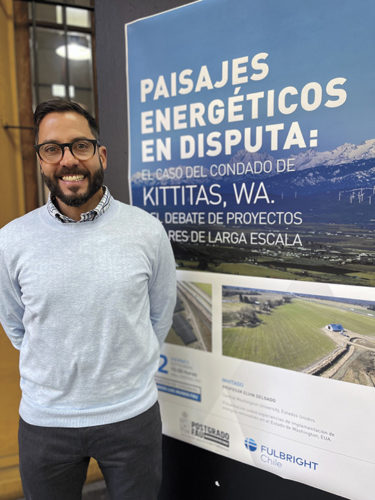
Associate Dean of the College of the Sciences Elvin Delgado spent three weeks in Chile last summer doing research and sharing his energy resource geography expertise with colleagues at the University of Santiago and other institutions.
He also collaborated in the development of a research grant proposal draft, met with undergraduate and doctoral students at the University of Chile, helped develop a draft syllabus for an online course about energy transition and rural energy landscapes, and more. Needless to say, Delgado’s experience in Chile was career-altering.
“I’m an associate dean now, but I am a scholar first—that will never change,” he said. “I love research and I will always stay involved in that, no matter where my career takes me.”
But even though Delgado’s Fulbright scholarship has ended, that doesn’t mean his work is completed—far from it. In the coming years, he will continue to collaborate with his new colleagues at the University of Chile and use what he has learned to enrich his CWU students and colleagues.
“One of the goals of this grant was to exchange knowledge and establish a new research agenda with scholars at the University of Chile,” said Delgado, regarded as an international expert on energy resource geography. “We will study and compare the socio-environmental and political-economic implications associated with energy transition policies that incentivize the deployment of renewable energy projects in Washington and Chile, which are dealing with many of the same energy transition issues.
“The work I am doing will ultimately benefit our students because my research informs my teaching,” he added.
For example, the online course he helped develop—titled “Rural Energy Landscapes”—will be team-taught by him and a professor in Chile, giving students at the University of Chile and CWU an opportunity to take the class simultaneously. Delgado also plans to participate in an academic exchange program with his Chilean colleagues, allowing both institutions to share vital energy transition research findings with one another.

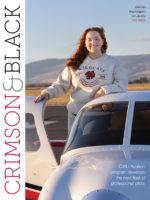
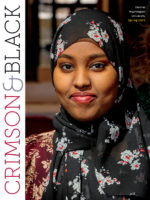
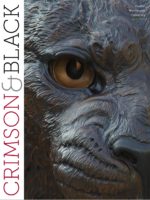
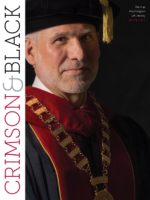
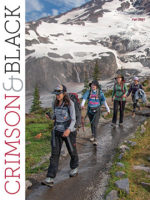
comments powered by Disqus